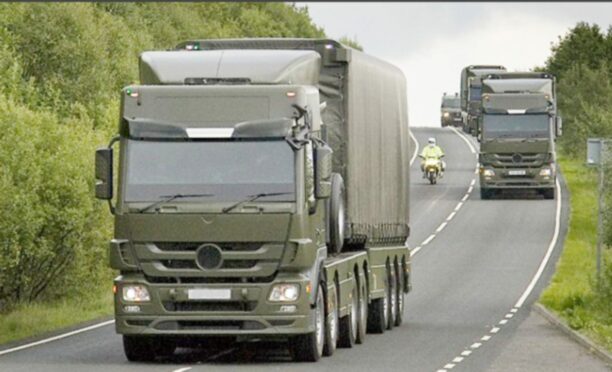
The nuclear bomb convoy that regularly crisscrosses the UK by road has logged 40 safety incidents in the last three years, according to official figures.
Convoy vehicles have crashed twice and got caught up in other road accidents five times. They have suffered multiple brake faults, breakdowns and power losses.
The convoy has also caused the closure of roads or motorway lanes 11 times and been delayed by lorry fires, a spillage and two outbreaks of Covid. In one case it had to deal with an “erratic driver interfering with the convoy” and in another it closed a road after a driver caught using a mobile phone tried to run away.
Campaigners described the safety lapses as “concerning” and argued that small incidents could easily escalate into something more serious. They said the risks being taken by the Ministry of Defence (MoD) were unjustified.
An SNP MP criticised the MoD for keeping the locations, dates and other details of the incidents secret. The MoD said that it only transported nuclear weapons “when necessary” and that the safety and security of the public was “the highest priority”.
A convoy of 20 or more vehicles transports nuclear warheads between the Burghfield nuclear weapons factory in Berkshire and the Royal Navy’s armaments depot at Coulport on Loch Long in Argyll and Bute at least six times a year. The warheads require regular maintenance.
In response to a request under freedom of information, the MoD released short summary logs of incidents involving the convoy during 2019, 2020 and 2021. The dates are blacked out and no locations are given.
Of the 40 incidents, 22 are categorised as “operational” and 18 as “engineering”. One of the two crashes involving a convoy vehicle caused “minor injuries” and a delay of two hours and 45 minutes. The other was attended by the police and caused a 32-minute delay.
The Ferret news website reported in 2018 the MoD recorded 157 safety incidents involving the convoy between 2008 and 2017. The number logged in 2017 (44) was a record high.
According to Nukewatch, a campaign group which monitors the nuclear convoys, most people weren’t aware that warheads are regularly transported by road. “Safety lapses relating to nuclear weapons are always concerning, and people will be surprised that these incidents are so common,” said the group’s Jane Tallents.
The Scottish Campaign for Nuclear Disarmament criticised the MoD for taking unjustified risks. “There is in fact no benefit arising from this risk-taking behaviour,” said the campaign’s David Mackenzie.
The MoD defended its decision to keep the dates of incidents from 2019 to 2021 secret, while accepting that they had previously been published. The information “would enable adversaries to build more of a picture of convoy movement which would allow them to make assessments on the warhead maintenance schedule,” the MoD said. “It would also increase the opportunity for transport convoys to be disrupted.”
The secrecy was criticised, however, by the SNP MP for West Dunbartonshire, Martin Docherty-Hughes. “The fact that the MoD has fought so hard not to provide this basic information tells us everything we need to know.”
The Ministry of Defence said: “All convoy operations follow strict and safe procedures”

Enjoy the convenience of having The Sunday Post delivered as a digital ePaper straight to your smartphone, tablet or computer.
Subscribe for only £5.49 a month and enjoy all the benefits of the printed paper as a digital replica.
Subscribe